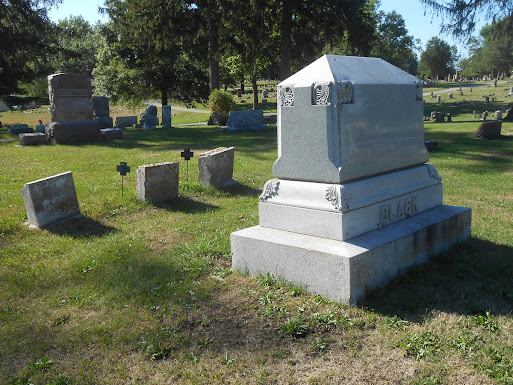I came across this image of Mabel Black, who died in Chariton at the age of 21 during late December, 1900, on Monday in a scrapbook maintained by members of the Pandora Club, organized by and for young women in Chariton during the 1890s. Club records, including two scrapbooks, are part of the Lucas County Historical Society collection.
I've written about this family before because two of Mabel's brothers, Sgt. William T. Black and Pvt. Walter N. Black, were among Lucas County's Spanish American War losses, both claimed by typhoid fever during 1898 --- See, if you like, "The men of Company H. say farewell to Sgt. Tom," "The Blacks, typhoid and Spanish American War loss," and "War, remembrance and the Black brothers."
Mabel was the third of Charles N. and Amanda Black's nine children to be claimed by typhoid during a two-year period and was buried beside her brothers in the Chariton Cemetery although their parents, who eventually moved back to their native Sandyville in Warren County, are buried there.
Here's the text of her story-telling obituary, published in The Chariton Patriot of Jan. 3, 1901, and pasted alongside the photograph on a fragile page in the Pandora Club scrapbook:
+++
Died, Sunday, Dec. 30, 1900, at midnight, at the home of her parents, Mr. and Mrs. C.N. Black in this city, Miss Mabel Ann Black.
Funeral services were held from the Presbyterian church Wednesday afternoon at 3 o'clock, conducted by the pastor, Rev. A.C. Ormond, and all that was earthly of that lovely girl was laid to rest in the Chariton cemetery beside her brothers --- Thomas, who died of typhoid fever at Jacksonville, Florida, July 19, 1898, and Walter, who also contracted the disease there and died Sept. 28, 1898, while enlisted with Co. H.
She had been seriously sick for four weeks with typhoid fever, but was thought to be out of danger, when acute pneumonia set in, causing death in a few hours.
Miss Mabel Black was born near Milo, in Warren county, Aug. 18, 1879. During the years 1896-96 she attended Simpson College, in Indianola, and while there joined the Mehodist church, but had never removed her membership (from the Presbyterian Church). About six years ago she came to Chariton with her parents and made this city her home.
Being of that kind and sympathetic nature that always wants to help persons in distress, she decided to become a professional nurse, taking a course of two years in the Iowa City Training School for Nurses. While there she became acquainted with Dr. J.R. Gardner, to whom she afterward plighted her troth and who came and assisted in caring for her during her illness. She came home last April to become more proficient in household duties, and fit herself to preside over a home, and prepare for the happy event which should link her life with that of Dr. Gardner.
In compliance with urgent requests, she occasionally would take care of a patient, and it was while nursing Mrs. Keller in Benton township that she contracted the fatal disease.
She was an honored member of the Pandora Club, who gave a beautiful flower piece. The nurses of Iowa City also sent a lovely bouquet, and the floral offerings from other friends were numerous and beautiful.
The death of that noble girl is indeed a sad blow to the parents and six sisters who are left to mourn the departure of a dear daughter and sister, and to Dr. Gardner, to whom she was to have been married during the holidays. She was modest and retiring, but possessed a cheerful disposition, ever ready to assist the needy, and scattered sunshine wherever she went. Although her sufferings during her sickness were intense, yet during her conscious hours she never uttered any complaint.
The death of such a promising, useful young woman makes us silent before God, yet where He brings His cross He brings His presence, and uses sometimes the very grief itself, straining it to a sweetness of faith, unattainable to those ignorant of any grief. She has escaped the weariness, the toils, the struggle and temptations of this chequered life, and who shall not say, sorrow laded though we be, that it is not better so. That a higher than human power may comfort and console the afflicted ones under this heavy stroke is the hope of the entire community.




No comments:
Post a Comment